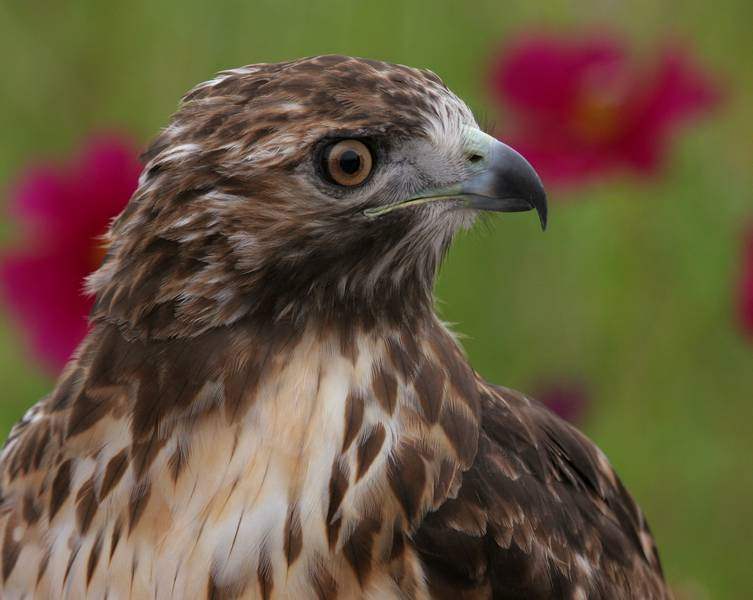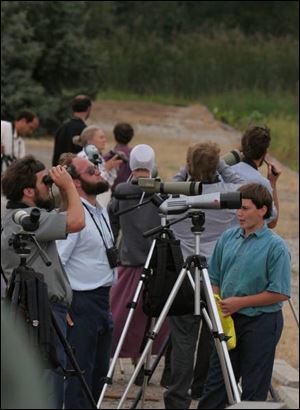
Migrating raptors take center stage in Michigan
9/18/2005
A male red-tailed hawk was among the many migrating raptors that could be viewed at Hawkfest 2005.
ROCKWOOD, Mich. - There's a whole lot of neck-straining going on here this weekend.
At the marshy Point Mouillee State Game Area yesterday, there were so many skyward-gazing people holding binoculars and huddled between tripods that, if you didn't know any better, you might have thought you were along Florida's Atlantic Coast waiting for a space shuttle launch.
But what has captivated people is the upward movement of something else: birds of prey.
This is the peak weekend for raptors of all kinds - mostly hawks, eagles, and falcons - to leave Canada. From early September through late November, they make their annual sojourn to southern climates as far away as Central and South America.

A male red-tailed hawk was among the many migrating raptors that could be viewed at Hawkfest 2005.
Although factors such as wind, barometric pressure, temperature, and humidity have a lot to do with when the birds begin their trek, the third weekend in September statistically has yielded the greatest number of migrating birds of prey.
Hence the event called Hawkfest 2005.
Now in its 16th year, the event is a two-day celebration of migratory birds at the Lake Erie Metropark just north of the Monroe County line in Wayne County.

It's a chance for bird lovers to feast their eyes on some majestic creatures.
The festival, which resumes at 10 a.m. today and concludes at 5 p.m., is held inside and near the park's Marshlands Museum. There's no admission cost, but a daily entrance pass for the park is $4 per vehicle.
There are a number of information booths, displays, games, crafts, and live demonstrations.
Birders worked with Lake Erie Metropark officials to create Hawkfest years ago because the park's boat launch and the Point Mouillee game area just south of it offered chances for spectacular viewing.
Here's why: To conserve energy, hawks and other raptors try to get caught up in "thermals." These are large columns of rising air formed by the uneven heating of the Earth's surface. The rising air lifts the birds skyward, letting them glide rather than continuously flapping their wings.

Gerry Wykes, supervisor of Lake Erie Metropark s Marshland Museum, says 5,000 people typically attend Hawkfest.
Thermals don't occur over water. Therefore, many birds from Canada fly across the Detroit River by following Ontario's southwestern peninsula so that they can avoid Lake Erie and other large bodies of water. They often fly in large groups, known as "kettles," to further conserve energy.
Dave Mendus, vice president of Southeastern Michigan Raptor Research, a group that has been compiling migration figures since 1983, said the vicinity of land in and around Lake Erie Metropark is second only to Corpus Christi, Texas, in terms of productivity for viewing raptors within the continental United States.
Sixteen to 19 species of birds are normally counted in this area, although there have been as many as 22 in one year.
Mr. Mendus said he's fascinated by the mechanism in nature that has told birds where and when to fly as long as man has been on Earth. Many people never knew or considered what was going on over their heads, he said.
"It's just the sheer spectacle of migration that got me hooked on it," he said.
"This isn't something that just started this year. It's been happening thousands of years."
Americans have grown weary of hurricanes, especially lately in the aftermath of the destruction wrought upon New Orleans and other parts of the Gulf Coast by Hurricane Katrina.
But six years ago yesterday, area birders documented an amazing sight because of a hurricane. In battering the North Carolina coastline on Sept. 16, 1999, Hurricane Floyd blocked a number of flyways in the eastern United States.
Consequently, more broad-winged hawks and other raptors came through this area.
On Sept. 17, 1999 - one day after the hurricane - an amazing 555,371 broad-winged hawks alone were spotted above Lake Erie Metropark.
That's more than twice as many of that species, statistically the most prevalent of the raptors that come through the area, than would normally be spotted.
Some 375,985 broad-winged hawks were documented in just one hour that day. Of those, 100,970 were tallied during a mere 11-minute period.
"It was like a river of birds," recalled Terry Angevine, one of Southeastern Michigan Raptor Research's board members. "They just kept coming."
Jeff Schultz, another board member and a former president of the group, said birders had their fingers crossed for another unusually heavy turnout this weekend because a different storm, Hurricane Ophelia.
It finally lashed out at the North Carolina shoreline last week and headed toward the New England coastline after getting stalled by fronts out in the Atlantic for a few days.
Ophelia's eye never hit land in North Carolina, which vastly reduced that hurricane's impact. Although birders are glad those people were spared, they now also don't expect the same impact on bird flyways as happened with Floyd in 1999.
"We were hoping, but we think it's about three days late. It moved so slow," Mr. Schultz said of Ophelia.
Gerry Wykes, supervisor of Lake Erie Metropark's Marshland Museum, said Hawkfest typically draws 5,000 or more people over its two days.
Bird novices are more than welcome: Mr. Wykes said he loves what the event does in terms of making the layman more cognizant of the region's ecological needs, such as preserving water quality and hawk habitat.
"We could preach to the choir, but basically what we want to do is expand the congregation," he said.
Contact Tom Henry at:
thenry@theblade.com
or 419-724-6079.